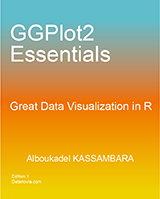This R tutorial describes how to create a box plot using R software and ggplot2 package.
The function geom_boxplot() is used. A simplified format is :
geom_boxplot(outlier.colour="black", outlier.shape=16,
outlier.size=2, notch=FALSE)- outlier.colour, outlier.shape, outlier.size : The color, the shape and the size for outlying points
- notch : logical value. If TRUE, make a notched box plot. The notch displays a confidence interval around the median which is normally based on the median +/- 1.58*IQR/sqrt(n). Notches are used to compare groups; if the notches of two boxes do not overlap, this is a strong evidence that the medians differ.

Related Book:

GGPlot2 Essentials for Great Data Visualization in R
Prepare the data
ToothGrowth data sets are used :
# Convert the variable dose from a numeric to a factor variable
ToothGrowth$dose <- as.factor(ToothGrowth$dose)
head(ToothGrowth)## len supp dose
## 1 4.2 VC 0.5
## 2 11.5 VC 0.5
## 3 7.3 VC 0.5
## 4 5.8 VC 0.5
## 5 6.4 VC 0.5
## 6 10.0 VC 0.5Make sure that the variable dose is converted as a factor variable using the above R script.
Basic box plots
library(ggplot2)
# Basic box plot
p <- ggplot(ToothGrowth, aes(x=dose, y=len)) +
geom_boxplot()
p
# Rotate the box plot
p + coord_flip()
# Notched box plot
ggplot(ToothGrowth, aes(x=dose, y=len)) +
geom_boxplot(notch=TRUE)
# Change outlier, color, shape and size
ggplot(ToothGrowth, aes(x=dose, y=len)) +
geom_boxplot(outlier.colour="red", outlier.shape=8,
outlier.size=4)



The function stat_summary() can be used to add mean points to a box plot :
# Box plot with mean points
p + stat_summary(fun.y=mean, geom="point", shape=23, size=4)
Choose which items to display :
p + scale_x_discrete(limits=c("0.5", "2"))
Box plot with dots
Dots (or points) can be added to a box plot using the functions geom_dotplot() or geom_jitter() :
# Box plot with dot plot
p + geom_dotplot(binaxis='y', stackdir='center', dotsize=1)
# Box plot with jittered points
# 0.2 : degree of jitter in x direction
p + geom_jitter(shape=16, position=position_jitter(0.2))

Change box plot colors by groups
Change box plot line colors
Box plot line colors can be automatically controlled by the levels of the variable dose :
# Change box plot line colors by groups
p<-ggplot(ToothGrowth, aes(x=dose, y=len, color=dose)) +
geom_boxplot()
p
It is also possible to change manually box plot line colors using the functions :
- scale_color_manual() : to use custom colors
- scale_color_brewer() : to use color palettes from RColorBrewer package
- scale_color_grey() : to use grey color palettes
# Use custom color palettes
p+scale_color_manual(values=c("#999999", "#E69F00", "#56B4E9"))
# Use brewer color palettes
p+scale_color_brewer(palette="Dark2")
# Use grey scale
p + scale_color_grey() + theme_classic()


Read more on ggplot2 colors here : ggplot2 colors
Change box plot fill colors
In the R code below, box plot fill colors are automatically controlled by the levels of dose :
# Use single color
ggplot(ToothGrowth, aes(x=dose, y=len)) +
geom_boxplot(fill='#A4A4A4', color="black")+
theme_classic()
# Change box plot colors by groups
p<-ggplot(ToothGrowth, aes(x=dose, y=len, fill=dose)) +
geom_boxplot()
p

It is also possible to change manually box plot fill colors using the functions :
- scale_fill_manual() : to use custom colors
- scale_fill_brewer() : to use color palettes from RColorBrewer package
- scale_fill_grey() : to use grey color palettes
# Use custom color palettes
p+scale_fill_manual(values=c("#999999", "#E69F00", "#56B4E9"))
# use brewer color palettes
p+scale_fill_brewer(palette="Dark2")
# Use grey scale
p + scale_fill_grey() + theme_classic()


Read more on ggplot2 colors here : ggplot2 colors
Change the legend position
p + theme(legend.position="top")
p + theme(legend.position="bottom")
p + theme(legend.position="none") # Remove legend


The allowed values for the arguments legend.position are : “left”,“top”, “right”, “bottom”.
Read more on ggplot legend : ggplot2 legend
Change the order of items in the legend
The function scale_x_discrete can be used to change the order of items to “2”, “0.5”, “1” :
p + scale_x_discrete(limits=c("2", "0.5", "1"))
Box plot with multiple groups
# Change box plot colors by groups
ggplot(ToothGrowth, aes(x=dose, y=len, fill=supp)) +
geom_boxplot()
# Change the position
p<-ggplot(ToothGrowth, aes(x=dose, y=len, fill=supp)) +
geom_boxplot(position=position_dodge(1))
p

Change box plot colors and add dots :
# Add dots
p + geom_dotplot(binaxis='y', stackdir='center',
position=position_dodge(1))
# Change colors
p+scale_fill_manual(values=c("#999999", "#E69F00", "#56B4E9"))

Customized box plots
# Basic box plot
ggplot(ToothGrowth, aes(x=dose, y=len)) +
geom_boxplot(fill="gray")+
labs(title="Plot of length per dose",x="Dose (mg)", y = "Length")+
theme_classic()
# Change automatically color by groups
bp <- ggplot(ToothGrowth, aes(x=dose, y=len, fill=dose)) +
geom_boxplot()+
labs(title="Plot of length per dose",x="Dose (mg)", y = "Length")
bp + theme_classic()

Change fill colors manually :
# Continuous colors
bp + scale_fill_brewer(palette="Blues") + theme_classic()
# Discrete colors
bp + scale_fill_brewer(palette="Dark2") + theme_minimal()
# Gradient colors
bp + scale_fill_brewer(palette="RdBu") + theme_minimal()


Read more on ggplot2 colors here : ggplot2 colors
Infos
This analysis has been performed using R software (ver. 3.1.2) and ggplot2 (ver. 1.0.0)